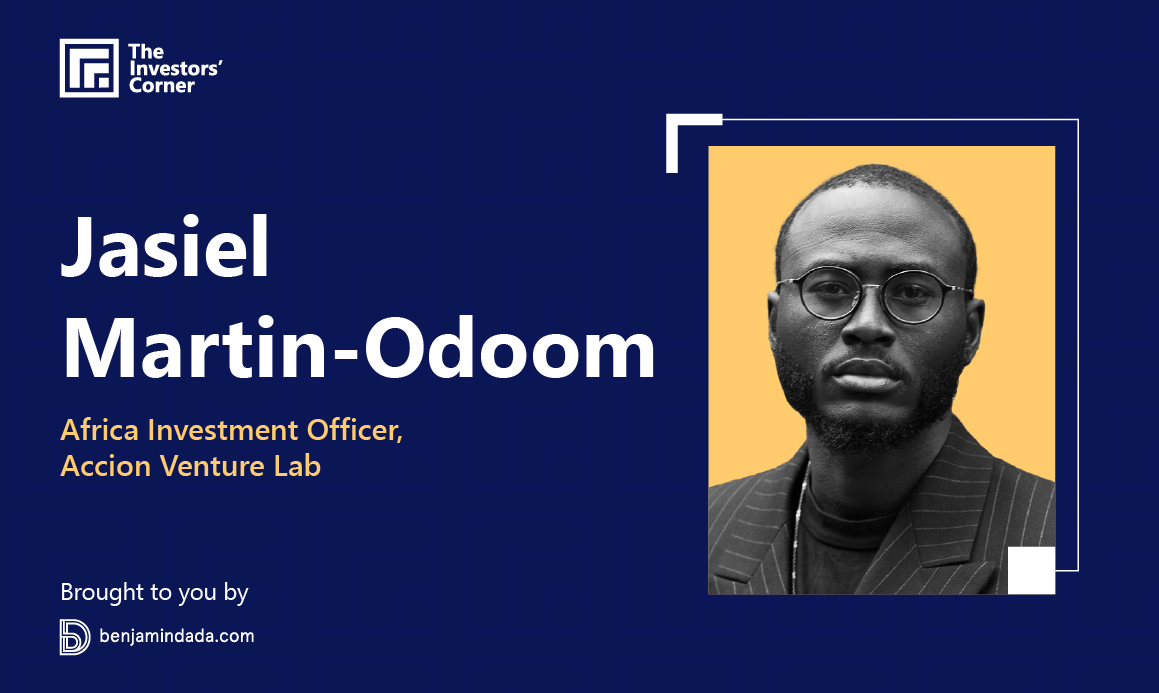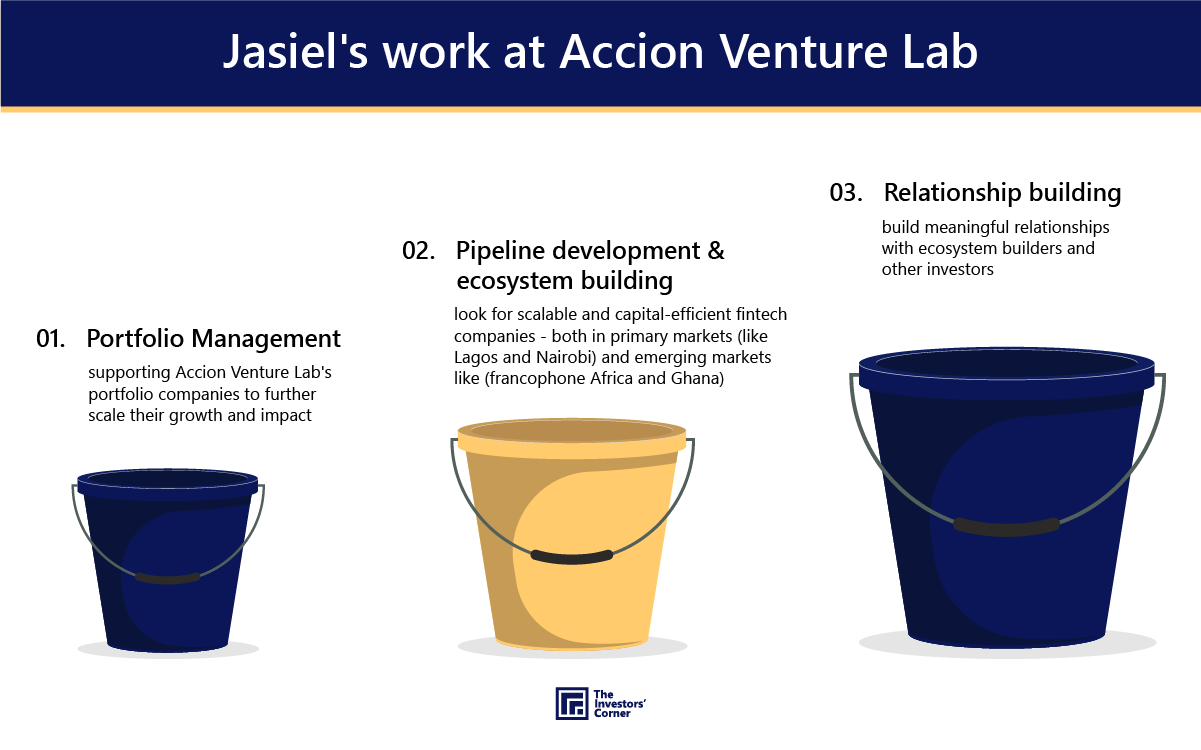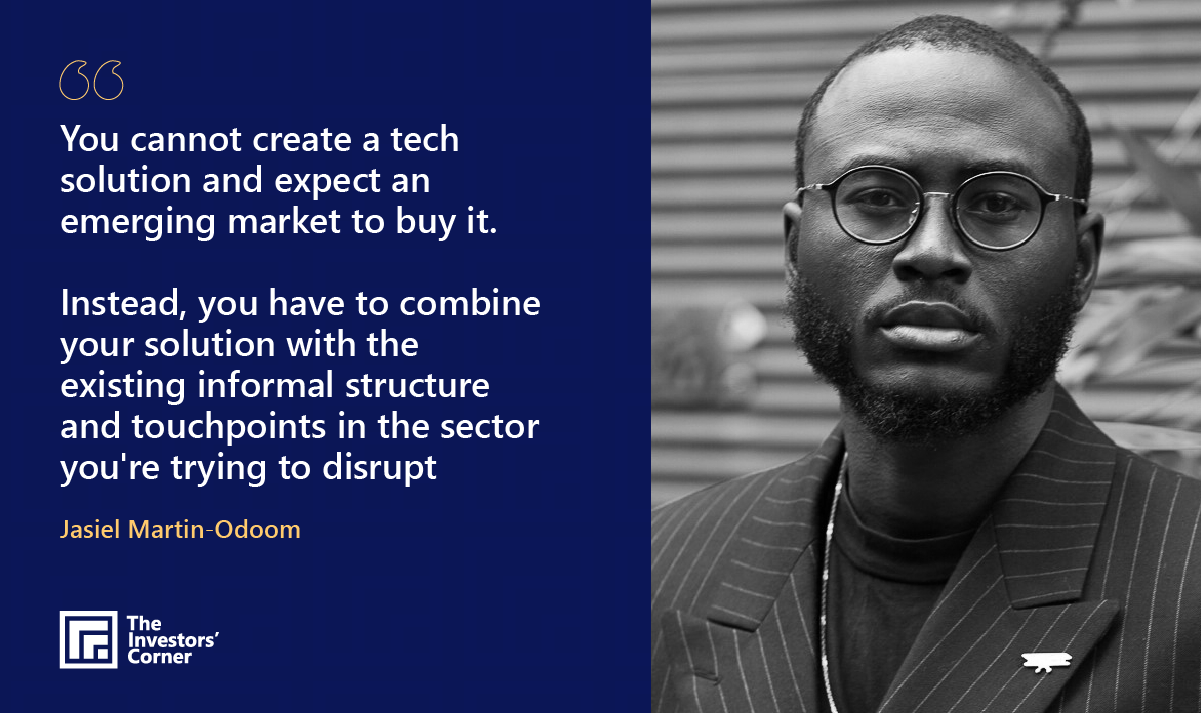How Jasiel Martin-Odoom helped 100+ startups that raised $2.5 billion in funding
In this episode of TIC, Jasiel Martin-Odoom talks about his career as Africa Investment Officer at Accion Venture Lab.

If you're active on Twitter, chances are high that you've come across insights on African tech, startups and gender-lens investing from @JasielInvests, an account that became a thought leader in less than a year.
Jasiel Martin-Odoom is the mind behind that Twitter account. An ex-investment banker and accomplished Venture Capitalist (VC) who has helped 100+ startups that raised $2.5 billion in funding, it's no surprise that Jasiel can write compelling insights daily. On top of that, he has a biweekly newsletter, Startup Definition Sunday, dedicated to helping founders gain clarity.
Interestingly, writing isn't Jasiel's full-time job. Instead, it's a side project he does after his day job at Accion Venture Lab, where he works as an Africa Investment Officer.
Jasiel and I caught up to explore his transition from Wall Street to African VC, his work at Accion Venture Lab, and how he managed to help 100+ startups raise billions of dollars in funding.
Let's get to it!
What is your job description at Accion?
To best understand my role, you'd have to think about it in three buckets. The first one is portfolio management. I'm tasked with supporting our African portfolio companies to further scale their growth and impact. This support ranges from talent placement to fundraising.
The second bucket comprises pipeline development and ecosystem building. Essentially, I look for scalable and capital-efficient fintech companies - both in primary markets (like Lagos and Nairobi) and emerging markets like (francophone Africa and Ghana) - that best fit our investment thesis.
The last bucket of my role entails relationship building, which extends outside work hours. Here, I get to build meaningful relationships with ecosystem builders and investors like myself. As a cherry on top, I leverage online writing to attract and engage startup founders.

JA: You have an interesting job description.
Jasiel: Thank you.
What informs Accion Venture Lab's laser focus on fintech?
The global financial system overlooks most people. Almost two billion people across the globe are unbanked, 60% of whom live in Africa. As if that’s not enough, over 60% of the world’s employed population are in the informal economy, meaning the majority lack formal access to banks’ financial services.
All these point to the need for financial inclusion, which tech-enabled companies can achieve at a large scale. At Accion Venture Lab, we are a leading early-stage fintech investor in emerging markets with significant experience in embedded finance. With our financial inclusion lens, we have invested in over 60 startups across emerging markets with 1/6th of our investments in Africa.
JA: Reasonable rationale!
What are the investment criteria at Accion Venture Lab?
We typically invest in startups using technology to build scalable, profitable businesses that provide financial services to the world's 1.8 billion financially underserved. We invest up to $1 million in pre-seed to pre-series A startups and can continue to follow on in subsequent rounds. Our diligence process takes anywhere from a month and a half to two months, including in-country diligence with the team, stakeholders, and customers.
Has the recent economic downturn affected Accion Venture Lab’s investment approach?
Not at all. During the euphoria of the last few years, we remained focused on the unit economics of the companies we invested in, and that hasn't changed. Given the significant implication of the downturn on fintech companies, we will continue to prioritize supporting our portfolio companies: Our in-house consulting/operations team works with portfolio companies post-investment to collaboratively address the top key needs that the founder(s) is focused on. In the past, we’ve helped refine pricing models, develop new go-to-market strategies, explore international expansion opportunities, build out credit policies, etc.
What types of fintech founders do you think will survive the downturn?
Fintech founders that will survive this downturn are those with a firm grasp of their financials and a scalable customer acquisition strategy. As global venture funding slows down, there is an increased focus on the unit economics of startups that are looking to raise. A founder who has spent time building a scalable customer acquisition strategy at positive unit economics and can communicate that with investors will stand out.
I expect that we’ll see that the eventual winners are those that efficiently deploy capital, achieve their milestones, and derisk their business at every investment stage.
JA: Amazing! How long have you been working at Accion Venture Lab?
Jasiel: 7 months.
What have you gleaned from your short stay at Accion Venture Lab so far?
One, you can never get past the value of unit economics. Nothing beats building a capital-efficient business. This is a crucial lesson proven by the downturn and our portfolio companies continued success.
Two, you cannot create a tech solution and expect an emerging market to buy it. Instead, you have to combine your solution with the existing informal structure and touchpoints in the sector you're trying to disrupt. We have learned from our portfolio companies that the tech and touch approach is critical for success in the markets we invest in.

Lastly, I've come to appreciate the importance of platform businesses in creating financial inclusion. Through Apollo Agriculture, one of our portfolio companies, I've seen the value a platform business can provide to smallholder farmers who need input financing to grow their crops.
JA: Useful lessons.
Have you always wanted to work in VC, though?
No. In fact, I wanted to become a criminal profiler and studied Criminal Justice at St. John's university.
Oh. So what changed?
One day at the university library, I stumbled on David Bornstein's How to Change the World. This book unlocked a new passion in me as it showed me a more sustainable way to create change, which had always interested me. As a result, I left for NYU Robert F. Wagner Graduate School of Public Service after graduation. There, I bagged an MPA (Masters of Public Administration) in Social Impact, Innovation, and Investment. This program deepened my understanding of impact investing as I got to be part of the NYU impact investment fund as a student manager. This position exposed me to the usefulness of corporate finance as a skill in startup investment. Basking in my new-found experience, I pursued a career in wall street by working at Goldman Sachs as an Investment Banking Analyst.
How long did you work at Goldman Sachs?
2 years and four months.
What happened after leaving Goldman?
I gave up my work visa in the UK and moved back home (Ghana) in late 2020 to work with founders on the continent. To kickstart this journey, I first worked at Unreasonable, a venture accelerator, where I was a portfolio manager supporting over 100 impact-focused companies in the UK & EMEA.
After a year, I joined Unreasonable's syndicate fund as a Senior Investment Associate responsible for all aspects of the deal execution process - from sourcing to supporting post-close operational initiatives. I did this for eight months and joined Accion Labs afterwards.
What a journey! Leaving Goldman Sachs for uncertainty must have been scary.
It was! It's hard leaving a high-paying job for an unknown future.
When did you feel validated about your decision to leave Wall Street?
I wish I could tell you I immediately knew it was the right decision, but I didn't. At first, it seemed I had made a grave mistake as things weren't rosy financially, but now that I look back, I'm glad I took the bold step. I love what I do currently.
Besides having more flexibility over my work hours and output, I'm more versatile and knowledgeable. Compared to investment banking, which required me to work mundanely, VC is exciting as there's so much to learn. I read 10x what I used to read as an investment banker. I'm also privileged to work with people building world-changing technologies.
What are the biggest key takeaways you've learned from your VC career?
First, I've learned the importance of supporting companies. Beyond giving capital to startups, funds need to provide strategic support because that's the primary way startups can survive in trying times such as a downturn.
Working in VC has also exposed me to the information asymmetry in Africa. There is a huge information gap limiting Africa's ecosystem's growth. Many founders lack access to the right information. This is what informs my regular writing on Twitter.






